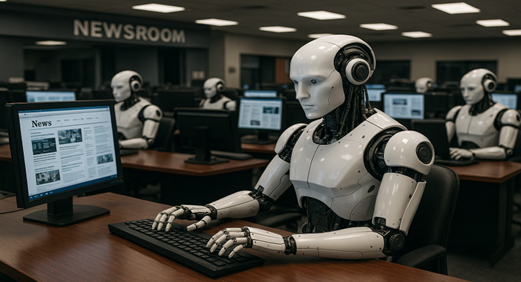AI in Stand-Up Comedy: Can Machines Master Humour?
- Shilpi Mondal

- 1 day ago
- 3 min read
SHILPI MONDAL| DATE: JUNE 03,2025

Introduction: The Rise of Algorithmic Comedy
Imagine a robot walking into a bar… and actually telling a joke that makes you laugh. A decade ago, this would have been pure science fiction. Today, artificial intelligence (AI) is not only generating jokes but also assisting comedians in refining their craft. From AI-powered joke-writing tools to algorithms that analyse audience reactions, machines are stepping onto the comedy stage—but can they truly master humour?
This blog explores the intersection of AI and stand-up comedy, focusing on Natural Language Processing (NLP) models that generate jokes and the challenges of algorithmic comedy. We’ll examine how AI is being used, where it falls short, and whether it can ever replace the human touch in comedy.
How AI Generates Jokes: The Science Behind NLP Comedy
AI doesn’t "understand" humour the way humans do—instead, it detects patterns in vast datasets of jokes, scripts, and comedic performances. NLP models like GPT-4 analyse linguistic structures, punchline timing, and wordplay to generate jokes.

Key Techniques in AI Joke Generation:
Template Extraction & Infilling: Some AI models extract joke structures (e.g., "Why did X cross the road?") and fill them with new content.
Pattern Recognition: AI identifies successful joke formulas (e.g., incongruity, surprise) from existing comedy datasets.
Audience Tailoring: Some tools analyse demographics to suggest jokes that resonate with specific crowds.
Example of AI-Generated Joke:
"Budget of new Batman movie swells to $200m as director insists on using real Batman."
While some AI jokes land, many fall flat—revealing the limitations of machine humor.
The Challenges of Algorithmic Comedy
Despite advancements, AI struggles with key aspects of comedy:

Lack of Human Context & Nuance:
AI-generated jokes often rely on stereotypes (e.g., a ChatGPT-written set about a "shopping-obsessed girlfriend" when asked for female-centric humour).
Humour thrives on lived experiences, cultural context, and emotional depth—elements that AI struggles to authentically replicate
Timing and Improvisation:
Stand-up comedy thrives on real-time audience interaction, adjusting delivery based on laughter (or silence). AI lacks this adaptability.
As comedian Jerrold B notes, "Comedy isn’t just punchlines—it’s reading the room."
Ethical Concerns: Bias and Originality:
AI models are trained on existing jokes, raising issues of plagiarism and unoriginality.
They can amplify biases, as seen in AI-generated material reinforcing gender clichés.
AI as a Comedy Assistant, Not a Replacement
Rather than replacing comedians, AI is becoming a creative collaborator:
How Comedians Use AI Today:
Brainstorming Tool: Comedians input premises, and AI suggests punchline variations.
Audience Analysis: AI tracks micro-expressions and engagement to refine performances.
Social Media Optimisation: Algorithms help comedians tailor clips for platforms like TikTok.
Case Study:
When comedian Karen Hobbs delivered a set written by AI, certain jokes landed, but the overall performance felt shallow, revealing the gaps in machine-generated humour.
The Future: Can AI Ever Be Truly Funny?
Experts are divided:
Optimists: believe AI will improve with better context-aware models.

Sceptics: Argue humour requires human spontaneity—something AI can’t replicate.
As Northeastern University’s Michael Ann DeVito notes, AI-generated George Carlin material "gets to the same conclusions, but inartfully."
Conclusion: A Punchline Without a Soul?
While AI is transforming comedy, authentic humour still springs from human experience. While machines can mimic jokes, they lack the authenticity, improvisation, and emotional depth that define great stand-up.
For now, AI’s role is best as a sidekick—helping comedians refine material, analyse crowds, and optimise digital reach. The future may bring more sophisticated AI humour, but the soul of comedy will always belong to humans.
So, can machines master humour? They’re learning—but the best laughs still come from living, breathing comedians.
Citations:
Mello-Klein, C. (2024, May 13). Is AI the future of stand-up comedy? An AI George Carlin standup special says otherwise. Northeastern Global News. https://news.northeastern.edu/2024/01/23/ai-george-carlin-standup-comedy/
Nafzger, A. (2025, May 31). The new gatekeeper in comedy: algorithms over audiences. Medium. https://medium.com/@alan.nafzger/the-new-gatekeeper-in-comedy-algorithms-over-audiences-e2551ee60fbd
Ray. (2024, January 24). AI models Understanding jokes and humor: Machine Learning Jokes Attributes list. NewOaks AI. https://www.newoaks.ai/blog/ai-models-understanding-jokes-and-humor/
Goel, M., Krishnamurthy, P., & Mamidi, R. (2024, December 1). Automating Humor: A novel approach to joke generation using template extraction and infilling. ACL Anthology. https://aclanthology.org/2024.icon-1.51/
Tyron, L. (2024, November 17). How AI is changing the game for comedians: Smarter jokes and audience insight. Medium. https://medium.com/@leontyron/how-ai-is-changing-the-game-for-comedians-smarter-jokes-and-audience-insight-26c436786bfd
Image Citations:
Benford, J. (2023, August 2). Could AI be the end of Stand Up Comedy? Comedian Jerrold B. https://www.jerroldb.com/could-ai-be-the-end-of-stand-up-comedy/
Wilson, M. (2024, June 20). Pro comedians tried using ChatGPT and Google Gemini to write their jokes – these were the hilariously unfunny results. TechRadar. https://www.techradar.com/computing/artificial-intelligence/pro-comedians-tried-using-chatgpt-and-google-gemini-to-write-their-jokes-these-were-the-hilariously-unfunny-results
Us, A. J. W. (2024, July 5). There’s one thing AI can’t do: be funny. The Week. https://theweek.com/tech/AI-artificial-intelligence-humor-funny





Comments